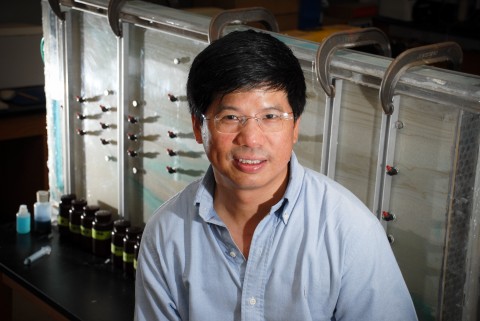By Venkata Vemuri
BEIJING - You may have heard that a water shortage is threatening China’s economy and that in the next 20 years the problem could become severe.
As China struggles to head off the problem, an expert in water in China at the University of Alabama, Dr. Chunmiao Zheng, said the water shortage and problems with pollution have “already become a limiting factor for sustainable economic growth in many parts of China.”
In his Birdsall-Dreiss Distinguished Lecture at the University of Sheffield in England earlier this year, Dr. Zheng, said that 400 of China’s 660 main cities have begun to run short of water. In 110 of the cities, he said, the shortage is severe.
Dr. Zheng said China’s wetlands have shrunk drastically and some rivers have dried up. Most of the country’s underground water reservoirs, known as aquifers, are contaminated to some degree. In many parts of China, he said, the water level in the aquifers is falling three feet a year.
In one example, Dr. Zheng, who is a visiting professor at Peking University in Beijing and the founding director of its Center for Water Research, cited the Yulin region in Shaanxi province, a key source of energy for China. There, he said, the scarcity of water has forced policy makers to scrap some industrial projects.
Two years ago, Dr. Zheng recalled, the government of China designated water and energy as its top two priorities. Over the next five years, he said, the government plans to spend nearly 150 billion on water treatment and water supplies.
The government is responding to a powerful incentive. If nothing changed in China, Dr. Zheng said, by 2030, the country would be consuming almost all its available water – with no margin for further growth.
As part of its solution, Dr. Zheng said, China plans to dredge new channels and build pumping stations and tunnels to shift 45 billion cubic meters of water from its ‘wet’ south to its ‘dry’ north. But that will cost $60 billion and amount to no more than six percent of the water needed in 2030.
Dr. Zheng said there is probably no single solution that would fix China’s water shortage. Instead, he said, “a multitude of programs must be developed.” He said the programs would mainly involve engineering feats. But he added that “a comprehensive solution also requires careful consideration of social, economic, and institutional factors. End china section
Imagine Mount Everest without Snow
KATHMANDU, Nepal - Apa Sherpa, one of the world’s most accomplished mountain climbers, says it will be much more difficult climbing the world’s tallest peak, Mount Everest, as rising global temperatures continue to melt high-altitude glaciers and snow. Trust Apa Sherpa. He has climbed to the summit of Mount Everest 19 times - more than anyone else. He knows every nook enroute to the top.
Sherpa told Reuters in May after his latest trip to the top that snow melt makes climbing more difficult, partly “because walking on naked rocks wearing crampons is hard.”
Sherpa dedicated his latest climb to calling attention to Climate Change. Up the mountain he carried a banner that read: “Stop Climate Change; Let the Himalayas Live!”
The snow and glacier melt threatens millions of lives in Nepal and India where people are largely dependent on water from rivers originating from the glaciers. #

